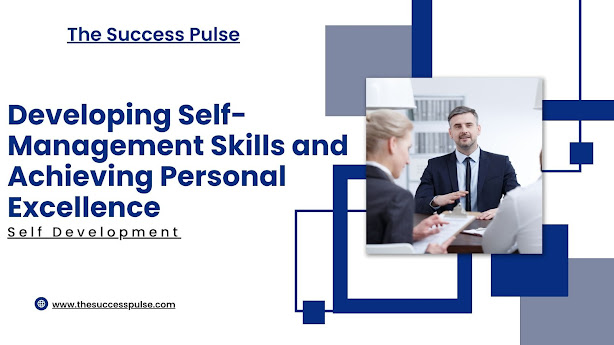Self-management is an essential skill that can significantly impact your personal and professional life. It involves regulating your emotions, behaviors, and time effectively to reach your goals and attain personal excellence. In this comprehensive article, we will delve deep into the concept of self-management, its various aspects, and provide practical guidance on how to develop these skills to achieve personal excellence.
Understanding Self-Management
Self-management is a multifaceted skill encompassing emotional regulation, time management, self-discipline, goal setting, and more. It involves your ability to control impulses, make informed decisions, and maintain a sense of balance in life. Effective self-management plays a vital role in achieving personal excellence.
For example, consider a student who sets a clear goal to excel academically. They need to manage their time effectively to allocate enough hours for studying, attend classes regularly, and avoid procrastination. In addition, they must develop self-discipline to resist distractions like social media and prioritize their studies.
Setting Clear Goals
Goal setting is a fundamental aspect of self-management. Well-defined goals provide direction and purpose in life, serving as a roadmap to personal excellence. To stay motivated and focused, it is crucial to establish both short-term and long-term goals.
For instance, a professional aiming for a promotion may set a clear goal of acquiring new skills and qualifications within a specific time frame. This goal will help them prioritize their efforts and align their actions with the desired outcome.
Prioritizing Time Management
Time is a finite resource, and managing it efficiently is a key aspect of personal excellence. Effective time management requires setting priorities, creating schedules, and eliminating time-wasting activities. It empowers you to allocate your time to tasks that are most important, thereby enhancing productivity and overall well-being.
Imagine an entrepreneur with a busy schedule. Effective time management can help them allocate time to various business operations, meetings, and personal life. They may prioritize crucial tasks, delegate when possible, and maintain a workable work-life balance.
Enhancing Emotional Intelligence
Emotional intelligence is a critical component of self-management. It entails recognizing and managing your emotions, understanding how they influence your actions and interactions with others. Developing emotional intelligence can improve your relationships, decision-making, and self-control.
For example, consider a team leader in a high-stress project. Their ability to manage their emotions and understand the emotional needs of their team members can significantly impact the project's success. Emotional intelligence enables them to provide support, address conflicts, and maintain a positive team atmosphere.
Developing Self-Discipline
Self-discipline is the capacity to control your actions, especially when faced with temptations or distractions. It is a fundamental skill in self-management, as it ensures you remain committed to your goals and make consistent progress. While developing self-discipline takes practice, it ultimately leads to substantial personal growth.
A classic example of self-discipline is an athlete's rigorous training regimen. To reach their full potential, they need to adhere to a strict schedule, maintain a balanced diet, and avoid unhealthy habits. Their self-discipline keeps them on track and enables them to perform at their best.
Effective Stress Management
Stress is an inevitable part of life, and how you manage it profoundly affects personal excellence. Techniques such as meditation, deep breathing, and physical exercise can help you cope with stress and maintain emotional balance.
Consider a corporate executive dealing with a high-pressure job. Effective stress management techniques can help them stay calm and focused during challenging situations. They may take short breaks to meditate, practice mindfulness, or engage in physical activities to reduce stress levels.
Building Resilience
Resilience is the ability to bounce back from adversity and challenges. Developing resilience is an important facet of self-management because it ensures that setbacks and failures do not deter you from your goals. Resilient individuals view challenges as opportunities for growth and learning.
Imagine a small business owner facing financial difficulties. Resilience helps them remain determined and adaptable. They learn from their setbacks, adjust their strategies, and use failures as stepping stones to eventual success.
Continuous Learning
Committing to lifelong learning is another key element of personal excellence. It entails maintaining curiosity, seeking new knowledge, and adapting to change. In an ever-evolving world, those who continue to learn and grow will be better equipped to manage themselves and excel in their endeavors.
Consider a tech-savvy individual working in the fast-paced IT industry. They understand the importance of continuous learning to stay updated with the latest technologies and trends. Their commitment to learning allows them to remain competitive and excel in their career.
Seeking Feedback and Self-Reflection
Feedback and self-reflection are invaluable tools for self-improvement. Seeking feedback from others can provide insights into areas where you can enhance your self-management skills. Self-reflection allows you to evaluate your actions and behaviors, making necessary adjustments along the way.
Imagine a teacher who seeks feedback from students to improve their teaching methods. By listening to students' input, they can identify areas that need enhancement, leading to a more effective and engaging learning experience.
Respecting Work-Life Balance
Achieving personal excellence should not come at the cost of your well-being and personal life. Maintaining a healthy work-life balance is vital for long-term success and self-management. It ensures you have time for relaxation, hobbies, and quality time with loved ones.
For instance, a dedicated professional may realize the importance of maintaining a work-life balance to prevent burnout. They schedule regular breaks, spend quality time with family and friends, and engage in hobbies or activities they are passionate about.

